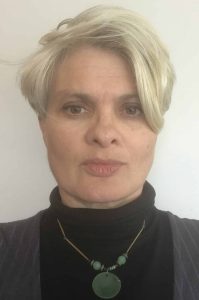 Frances Wedgwood is a GP, educator and primary care researcher in Kent. She is on X: @FrancesWedgwood
Frances Wedgwood is a GP, educator and primary care researcher in Kent. She is on X: @FrancesWedgwood
Mabel is struggling. She doesn’t know the UK well and has just moved from the city to a tiny bedsit in a run-down county town to start her GP training. Her husband is working on a different continent, and her three small children are on a third, being cared for by her in-laws. She’s scared to go out into the town after dark and is miserable and lonely. Her mother in-law is supportive of her career but it’s so difficult to speak with the kids online and she’s worried her son is struggling at school. Every day she gets up in the dark and catches a bus, then a train, then a bus to another town where she is working in a hospital in an elderly care ward. She worked in this specialty in her own country but here everything is different, and she feels bewildered most of the time. None of her previous experience seems to help her and she sees the nurses and other doctors rolling their eyes as she tries to make sense of the differing medical practices and customs. She thought she would find friends in the hospital but instead she feels completely alone.
She has discovered she has something called an “e-portfolio” that’s apparently incredibly important.
Plus she has another completely unexpected struggle. She has discovered she has something called an “e-portfolio” that’s apparently incredibly important. She’s supposed to fill it out with ‘clinical case reviews’ and ‘workplace-based assessments’ but doesn’t know where to start. She thinks the other GP trainees might know but hasn’t been able to ask them as she keeps missing the weekly teaching as she forgets to ask for the rota manager for study leave in time. She dialled in to a helpful webinar but she was quite distracted while she did it as she was trying to contact her husband to talk about her son. The webinar lady said she must enter reflections into the portfolio several times a week, and she should try and imagine what her patients are experiencing, but she hasn’t had the courage to start writing because what on earth is she supposed to say? On top of this she has something called an ‘educational supervisor’ who keeps emailing her and seems to be pretty cross.
Priti is also struggling. She’s been trying to engage with Mabel. She’s sent her multiple emails and texts about meeting up for her first review, but Mabel hasn’t responded.
“It’s so unprofessional!” Priti complains to her education colleagues. “I know it’s been a very turbulent start for her, but she seems to have no concept that I am a busy professional too and I can’t just keep chasing her.” Priti is also concerned that Mabel is nowhere near meeting the proscribed number of assessments and reflections she should have done by six months, despite pointing this out again and again in emails to Mabel. “And she doesn’t have the first idea on how to write reflectively,” Priti sighs. “Her case reviews just summarise what she’s done on the wards – there’s no sense she’s thinking more deeply about the learning from each case. I’ve tried to make suggestions to improve her writing, but I don’t think she reads my feedback!” Priti is passionate about GP training, but she’s seen this before with a previous trainee who ended up leaving training due to poor health and multiple exam failures. Priti is feeling exhausted and burnt out. She’s not sure how much longer she can keep this up.
Mabel tries hard to improve but she doesn’t really get what Priti is expecting her to write in these ‘reflections’. And with all her worry about her family she has no energy to do the extra courses and webinars that Priti suggests. Six months later at her second review, Priti reluctantly tells Mabel that she’s performing well below expectations, and she will be referred to something terrifying called ‘panel’ to come to a decision on her progress. The panel chair is kind and understanding – she knows the year has been tough – but she is firm. She has just two weeks to complete the mandatory training components, the rest will have to be made up next year. But next year Mabel must also sit the compulsory ‘Applied Knowledge Test’, which she’s heard is really hard and often needs lots of re-sits. Mabel feels completely overwhelmed by the task ahead. Achieving all this within the three years her visa allows seems impossible. She fears disappointing her family if she fails but is even more anxious about the financial loss and potential deportation if she fails. Both Mabel and Priti feel very despondent.
Priti is passionate about GP training, but she’s … feeling exhausted and burnt out.
Mabel and Priti are fictional but based on learners and educators I worked with. There are hundreds of ‘Mabels’ and ‘Pritis’ and their stories are heroic; the trainer who helps her trainee get his kids into school by interceding with the headteacher, the educator who shows his trainee how to register and get a GP appointment for a fit note, the trainees separated from their families who succeed despite the odds stacked against them. It increasingly feels like there is an “inverse education law” that puts our Mabels and Pritis in this difficult position.
I recently completed a master’s research project in which I set out to examine how a deeper understanding of reflexivity in GP educators might inform inclusive practices. After conducting focus groups and semi-structured interviews, one of the themes that emerged was that of injustice and inequity, particularly in relation to what participants perceived as a lack of organisational reflexivity and structural racism.1 One of the participants ended our interview by invoking the inverse care law. This concept, formulated by Welsh GP Julian Tudor Hart in 1971, suggests that access to good healthcare is inversely proportional to the actual need for those services in a given population.2 It has been suggested that the same is true in medical education; those with less support needs have better training environments, while those who are most in need of support end up training in the most challenging, deprived areas.3
Inclusive leadership is needed to address this. Razack has argued that we need to actively challenge assumptions of a meritocracy in medical education; too often diversity is problematised rather than valorised.4 If NHS England is committed to the welfare of our educators and learners, it is vital to embed inclusive practices in medical education through structural change, such as fairer recruitment processes and increasing the length of training, as well as more role models. Only then can we meet the needs of the Mabels, isolated and bewildered in their bedsits, and the Pritis, disillusioned and close to quitting training, and build a truly inclusive workforce for the NHS.
References
1. Wedgwood F, Khan N. Reflexivity and inclusion in doctors’ training: a qualitive study of GP educators in the UK. [manuscript submitted for publication]. 2024.
2. Tudor Hart J. THE INVERSE CARE LAW. The Lancet. 1971 Feb;297(7696):405–12.
3. Health and Social Care Committee. The future of General Practice [Internet]. London: House of Commons; 2022 Oct. Report No.: HC 113. Available from: https://committees.parliament.uk/publications/30383/documents/176291/default/
4. Razack S, Risør T, Hodges B, Steinert Y. Beyond the cultural myth of medical meritocracy. Med Educ. 2020;54(1):46–53.
Featured photo by Cherry Laithang on Unsplash






